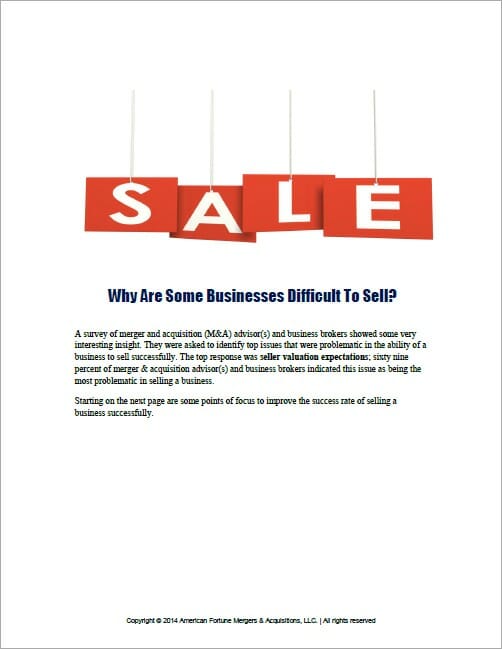Selling a Company Guide to Baby Boomers
Nearly every business owner has heard that timing is important when selling a company. And, certainly, it is well documented that the timing of external factors – like changes in the economy, availability of funding, and the rise and fall of interest and tax rates – can have a profound effect on the value and sale-ability of a business.
Private business owners will be among the ranks of retiring Baby Boomers looking to selling a company. In the 1960s and 70s, many Baby Boomers started their own businesses. As a result of the aging business owner population, roughly 40% of the family-owned businesses in the United States are expected to experience a leadership change in the next five years.
Many studies point to the fact that many of these owners will be selling companies that they own on the open market in hopes of funding their retirement and enjoying the benefits of a lifetime of hard work.
Baby Boomer business owners may find that selling a company at the right time could be a means to obtain the funds they need to maintain a comfortable lifestyle during their retirement years. Their need to liquefy assets could be underscored by the fact that Baby Boomers are considered a generation of poor savers. Research magazine reports that the majority of Baby Boomers will not have sufficient funds to retire when they hit the traditional retirement age of 65.
With their retirement resources often riding on a company sale, Baby Boomer business owners are encouraged to explore the factors that may signal the best time to selling a business. An uncertain economy, low interest rates, and favorable capital gains tax rates have prompted many business owners to cash out.
Considerations to Selling a Business
The decision to sell can be a difficult and emotional turning point for the business owner, and the motivation for selling is often complicated and subjective. Reasons include retirement, health issues, desire for liquidity, partnership disputes, diminished interest, lack of operating growth capital, and lack of suitable heirs, among others.
Regardless of the reason, the decision to sell a business involves extensive planning and preparation in order to negotiate and execute a sale on the most advantageous terms. An owner with a sound strategy for selling a business is often better able to realize an attractive value for the company than someone who enters the process unprepared.
The sale process typically includes financial appraisal and assessment of value, marketing the business, locating a prospective buyer, structuring the transaction, managing the buyer due diligence, negotiating and closing the transaction and post-close transaction. Despite the importance of having in place a clear-cut plan when deciding to selling a business, according to a recent survey of small business owners by M&A Today, 65% do not know what their company is worth and 85% have no exit strategy. Worse yet, many business owners fix a price in their mind and may directly or indirectly communicate that price to potential buyers and competitors.
Common Mistakes Made by Sellers
The typical business owner sells one business in his or her lifetime. On the contrary, corporate buyers often acquire multiple businesses each year, and financial buyers can be even more active. Invariably, inexperienced sellers can make mistakes that buyers can capitalize on. Some of the most common mistakes include the following:
Not knowing the value of the business – Private Business owners minimize profits to reduce taxes. Thus, their company’s financial statements often do not reflect the true profits and value of the business. As a result, many companies sold by their owners may be sold below market value.
Using a multiple or ratio to set price – There is no single multiple or ratio that applies to all privately held businesses and much depends on the industry type. Each business is unique and requires a comprehensive review and analysis of the company, as well as a strong understanding of the dynamics of the M&A marketplace, in order to determine potential market value.
Selling at the wrong time – Many sellers wait too long in selling a company, not understanding that one should sell when the market is ready. Conversely many business owners spend a lifetime building their businesses, only to sell hastily, failing to recoup the actual worth of the company.
Trying to rush the sale – Once an owner has decided to sell, she or he understandably wants the process to be over quickly. But preparation and selling businesses – including finding the best buyer – takes an average of 12 months, though each transaction is unique and time frames can vary widely.
Negotiating with only one buyer – Although business owners may feel more in control when dealing with a single suitor, generating interest from multiple buyers can significantly increase the probability of selling a business at or close to the asking price.
Not understanding the buyer’s motives – Rather than emphasizing the business’ growth potential, sellers often dwell on the past performance. Buyers, however, are looking for future revenue projections, return on investment, growth potential, and synergy.
Inadequate documentation – Buyers expect documentation in the form of 3-5 years financials as well as documented procedures, policies and systems, including recast financial statements and five-year pro formas, backed by solid research and analysis that shows the potential of the business for new owners.
Assessing and negotiating offers – Companies rarely sell for all cash at the closing with balance being in a form of seller financing, earnouts or stock in the acquiring company. Instead, terms are often structured and can have complex tax and legal implications. Sellers should be able to assess and negotiate the terms of the transaction from every angle: personal, legal, and financial.
Almost $5 trillion in liquidity is expected to be created by 2015 as aging Baby Boomers transition out of their closely held businesses to retirement. The three most common exit strategies are sale of the company, recapitalization, or ESOP. The potential rewards of a successful business sale are great, but this complex and often time-consuming process should be expertly managed.
To learn more about selling a company call 502-244-0480 to speak with a Advisor.
By Brian S. Mazar, CBI, MBA
American Fortune







